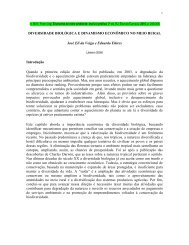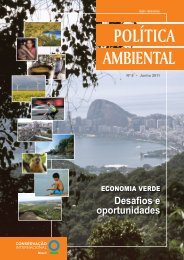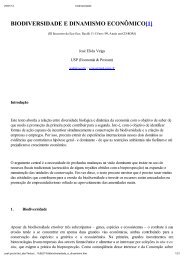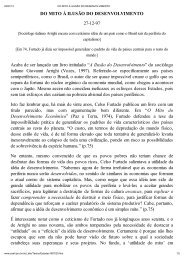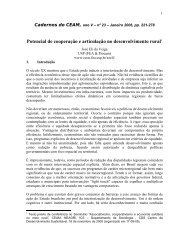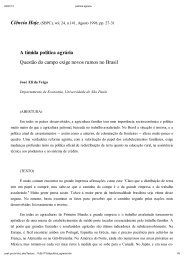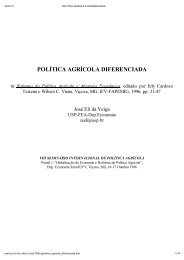sustainable development 20 years on from the ... - José Eli da Veiga
sustainable development 20 years on from the ... - José Eli da Veiga
sustainable development 20 years on from the ... - José Eli da Veiga
You also want an ePaper? Increase the reach of your titles
YUMPU automatically turns print PDFs into web optimized ePapers that Google loves.
187<br />
(UNDESA, <str<strong>on</strong>g>20</str<strong>on</strong>g>10a) and increasing difficulties in <strong>the</strong> main ec<strong>on</strong>omic sectors, namely financial services<br />
and tourism (ECLAC, <str<strong>on</strong>g>20</str<strong>on</strong>g>08a), as well as agriculture. Since many of <strong>the</strong> activities in <strong>the</strong> Barbados<br />
Programme of Acti<strong>on</strong> rely <strong>on</strong> nati<strong>on</strong>al budgets, a number of <strong>the</strong> gains achieved in <strong>the</strong> implementati<strong>on</strong> of<br />
<strong>the</strong> Programme of Acti<strong>on</strong> and <strong>the</strong> subsequent Mauritius Strategy are additi<strong>on</strong>ally being eroded by<br />
budgetary c<strong>on</strong>straints due to <strong>the</strong> repercussi<strong>on</strong>s of <strong>the</strong> global financial, food and energy crises.<br />
2. Capacity c<strong>on</strong>straints<br />
O<strong>the</strong>r difficulties for SIDS include c<strong>on</strong>straints in instituti<strong>on</strong>s and technical capacity. Governance in many<br />
SIDS is organized by sector (for example, energy, agriculture and health). C<strong>on</strong>sequently, a limited<br />
number of new policies are actually integrated across sectors or are <strong>the</strong> subject of significant public<br />
participati<strong>on</strong>. For example, ec<strong>on</strong>omic issues are sometimes divorced <strong>from</strong> envir<strong>on</strong>mental c<strong>on</strong>siderati<strong>on</strong>s<br />
and <strong>the</strong>re is <strong>on</strong>ly limited capacity for social planning (ECLAC, <str<strong>on</strong>g>20</str<strong>on</strong>g>10b). Existing instituti<strong>on</strong>s working <strong>on</strong><br />
<str<strong>on</strong>g>sustainable</str<strong>on</strong>g> <str<strong>on</strong>g>development</str<strong>on</strong>g> are underfunded, and <strong>the</strong> migrati<strong>on</strong> patterns of highly skilled and professi<strong>on</strong>al<br />
populati<strong>on</strong>s have c<strong>on</strong>tributed to a reliance <strong>on</strong> a project-oriented management approach that addresses<br />
short-term needs ra<strong>the</strong>r than a programme and resources management approach that takes a more<br />
integrated and l<strong>on</strong>g-term perspective. This has also resulted in a reliance <strong>on</strong> recruiting outside expertise at<br />
significant cost but with no c<strong>on</strong>tinuity, capacity-building or instituti<strong>on</strong>al streng<strong>the</strong>ning (Greene, <str<strong>on</strong>g>20</str<strong>on</strong>g>09;<br />
World Bank, <str<strong>on</strong>g>20</str<strong>on</strong>g>11). 11 Most of <strong>the</strong> educated residents of Caribbean SIDS emigrate, and <strong>the</strong> “brain drain”<br />
of public sector employees who work <strong>on</strong> <str<strong>on</strong>g>sustainable</str<strong>on</strong>g> <str<strong>on</strong>g>development</str<strong>on</strong>g> issues fur<strong>the</strong>r exacerbates <strong>the</strong> limited<br />
capacity of <strong>the</strong> countries (UNDESA, <str<strong>on</strong>g>20</str<strong>on</strong>g>10a). Lack of funding has also resulted in decreased capacity,<br />
such as incomplete <strong>da</strong>ta <strong>on</strong> <strong>the</strong> implementati<strong>on</strong> of <str<strong>on</strong>g>sustainable</str<strong>on</strong>g> <str<strong>on</strong>g>development</str<strong>on</strong>g> commitments and limited<br />
availability of quantitative tools for effective m<strong>on</strong>itoring and identificati<strong>on</strong> of corrective acti<strong>on</strong>s.<br />
Additi<strong>on</strong>ally, <strong>the</strong> <str<strong>on</strong>g>20</str<strong>on</strong>g>10 Mauritius Strategy review indicates a clear need to better c<strong>on</strong>soli<strong>da</strong>te and<br />
more effectively coordinate <strong>the</strong> existing resp<strong>on</strong>sibilities of <strong>the</strong> United Nati<strong>on</strong>s instituti<strong>on</strong>al entities that<br />
share resp<strong>on</strong>sibility for supporting <str<strong>on</strong>g>sustainable</str<strong>on</strong>g> <str<strong>on</strong>g>development</str<strong>on</strong>g> of <strong>the</strong> Caribbean SIDS, perhaps<br />
through a regi<strong>on</strong>al coordinating mechanism (ECLAC, <str<strong>on</strong>g>20</str<strong>on</strong>g>10b). This would allow a higher level of<br />
c<strong>on</strong>soli<strong>da</strong>ti<strong>on</strong>, integrati<strong>on</strong> and harm<strong>on</strong>izati<strong>on</strong> to implement <strong>the</strong> Barbados Programme of Acti<strong>on</strong> and <strong>the</strong><br />
Mauritius Strategy.<br />
3. Internati<strong>on</strong>al cooperati<strong>on</strong><br />
Less than anticipated internati<strong>on</strong>al cooperati<strong>on</strong> and <strong>the</strong> global trend of declining official <str<strong>on</strong>g>development</str<strong>on</strong>g><br />
assistance have also been evident in <strong>the</strong> Caribbean SIDS. Due to <strong>the</strong>ir classificati<strong>on</strong> as middle-income<br />
countries, most are excluded <strong>from</strong> a number of <str<strong>on</strong>g>development</str<strong>on</strong>g> opportunities. The criteri<strong>on</strong> for allocating<br />
funds <strong>on</strong> <strong>the</strong> basis of GDP does not adequately c<strong>on</strong>sider <strong>the</strong> particular challenges faced by SIDS. For<br />
instance, Caribbean SIDS that are not classified as least developed countries (LDCs) do not qualify for<br />
debt relief assistance. In additi<strong>on</strong>, <strong>the</strong>y are increasingly c<strong>on</strong>sidered ineligible for <str<strong>on</strong>g>development</str<strong>on</strong>g> aid<br />
(UNDESA, <str<strong>on</strong>g>20</str<strong>on</strong>g>10a), despite <strong>the</strong>ir high debt burdens, many of which are in excess of 100% of GDP<br />
(ECLAC, <str<strong>on</strong>g>20</str<strong>on</strong>g>08b).<br />
There have been numerous efforts to gain internati<strong>on</strong>al recogniti<strong>on</strong> to c<strong>on</strong>sider <strong>the</strong> particular<br />
<str<strong>on</strong>g>development</str<strong>on</strong>g> challenges faced by SIDS. In <str<strong>on</strong>g>20</str<strong>on</strong>g>02, <strong>the</strong> Caribbean Community urged <strong>the</strong> Internati<strong>on</strong>al<br />
C<strong>on</strong>ference <strong>on</strong> Financing for Development held in M<strong>on</strong>terrey, Mexico, to address this issue directly.<br />
11<br />
The emigrati<strong>on</strong> rate am<strong>on</strong>g <strong>the</strong> university-educated populati<strong>on</strong> is as high as 89% in Guyana (World Bank, <str<strong>on</strong>g>20</str<strong>on</strong>g>11).



